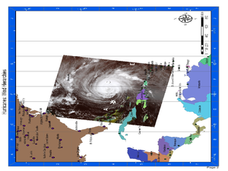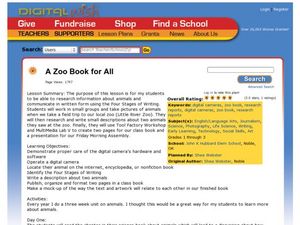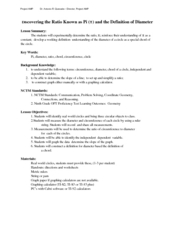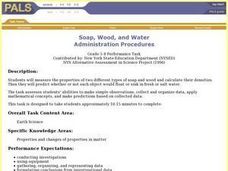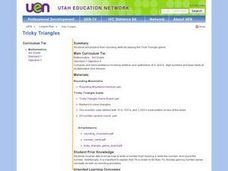Curated OER
Arkansas History Lesson: Arkansans
Third graders investigate famous Arkansans and their contributions. In this Arkansas history lesson, 3rd graders are divided into small groups and use a variety of resources to research one important Arkansan. Students write a biography...
Curated OER
Hurricane Winds: A Spatial Hierarchy of Processes at Different Scales
In this earth science lesson, students study a satellite image of hurricane Isabel and write answers to 5 questions that follow. They match predictions to the map locations.
Curated OER
Brine Shrimp Hatching Experiment
Learners hatch brine shrimp in a classroom experiment. In this hatching brine shrimp lesson, students participate in two-week lab in which they study how brine shrimp hatch under different conditions. They record data about the control...
Curated OER
The 8 Realms - Hawaiian Vegetation Divisions
Students study the attributes of the 8 realms of Hawaiian vegetation. In this Hawaiian vegetation lesson, students read project cards to determine the elevation, rainfall, and organisms that live in each realm. They make a poster that...
Curated OER
A Crust Full of Rocks
In this rock worksheet, students answer seven short answer questions about the composition of the earth's crust. Questions refer to metamorphic, igneous, and sedimentary rocks.
Curated OER
The Name Jar
Students participate in a lesson that focuses on the literature of Korea. "The Name Jar" is read by students to practice some essential reading skills. This would include the recognition of sequence in a story, characterization, and...
Curated OER
Evaluating Expressions Using Tiles
Sixth graders are shown a variety of algebraic equations. In groups, they use tiles to represent each expression in the equations. To end the lesson, they solve story problems with one and two unknown variables. Individuals share their...
Curated OER
A Zoo Book for All
A visit to the local zoo launches an integrated life science/ language arts research project into the habitat, feeding habits, offspring, lifespan, and other interesting facts about animals. Each group selects two animals to photograph...
Curated OER
Floating Fishes: Boat Sinking Lab
Cut milk cartons in half to make boats and let investigators attempt to sink them. They add dividing walls and observe what happens if marbles are put into only one of the newly formed compartments. Vocabulary is provided: buoyant force,...
Curated OER
Density of Minerals
Students determine the mass, volume, and density of two different mineral samples. Students show data and calculations as well as answer questions about the mineral identities.
Curated OER
Discovering The Ratio Pi And The Diameter
Students relate the ratio of Pi to the diameter of a circle. In this geometry lesson, students investigate the relationship of the chord of the circle the the number Pi. They define ration, chord, circumference and diameter and find...
Curated OER
Sedimentary Rocks- Formation and Types
In this sedimentary rocks resource worksheet, students follow the guide for reading this informational text. They read about the formation of sedimentary rocks, and the three major types of sedimentary rocks.
Curated OER
Behold the Mold!
Students explore how mold grows on various food items. In this mold lesson plan, students predict how mold will grow on dry vs. wet food items, and chart their observations daily. Children develop a summary to aid them in a summative...
Curated OER
Minimum, Maximum and Quartiles
In this statistics worksheet, students identify the different parts of a whisker plot. They find the minimum, maximum and the three different quartiles. There are 8 multiple choice questions with an answer key.
Curated OER
Soap, Wood, and Water
Students measure the properties of two different types of soap and wood and calculate their densities. Then they predict whether or not whether or not each object would float or sink in fresh or salt water.
Curated OER
It's Raining Meatballs
Students participate in activities to determine their macro process and elaborative process abilities. During macro processes readers organize and summarize ideas as they read. They look at the big picture of the entire text as well as...
Curated OER
Tricky Triangles
Third graders engage in a lesson that is concerned with the playing of a Trick Triangle Game while focusing upon developing skills of addition, subtraction, multiplication, and division. They play the game and practice rounding of...
Curated OER
One China for All?
Students explore relations among Taiwan, China and the United States in the 20th century.
Lycoming College
An Author Study of Jan Brett
Jan Brett, the author of many beloved children's books, is well worth a study. Try out this winter-themed unit, which covers areas of language arts as well as art, math, science, and social studies.
Curated OER
Interviewing Skills
Prepare your pupils for the world of work and the dreaded interview by providing class members with a resource packet that includes handy tips. After examining the materials, pairs conduct mock interviews and reflect on the experience....
Mathematics Vision Project
Module 6: Trigonometric Functions
Create trigonometric functions from circles. The first lesson of the module begins by finding coordinates along a circular path created by a Ferris Wheel. As the lessons progress, pupils graph trigonometric functions and relate them to...
EngageNY
Populations, Samples, and Generalizing from a Sample to a Population
Determine the difference between a sample statistic and a population characteristic. Pupils learn about populations and samples in the 14th portion in a unit of 25. Individuals calculate information directly from populations called...
Orlando Shakes
Henry V: Study Guide
Shakespeare did more than write timeless literary works—he coined words such as moonbeam, fortune-teller, and even eyeball! A study guide for Henry V introduces key words the Bard first used with a fun vocabulary activity, part of a...
BrainPOP
World History Lesson Plan: Uncovering Essential Questions
Have you ever noticed a news story revolves around an essential question? Scholars research methods of reporting historical events. Working in groups, they use an interactive module to gather information on a historical topic, uncovering...



